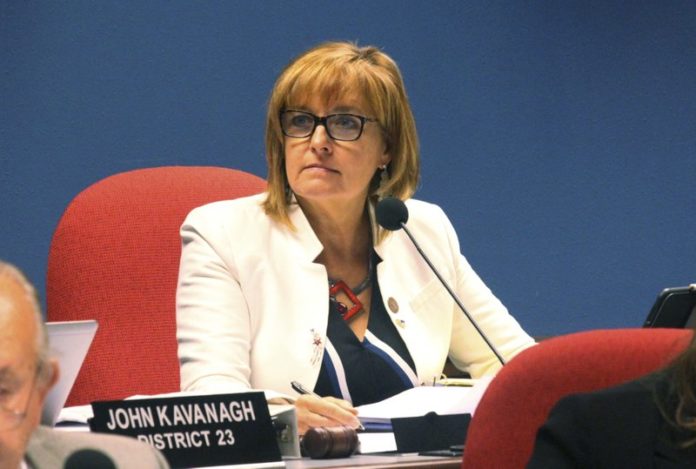
A proposal in the Arizona Senate would ban most abortions even before many women know they are pregnant by making it a felony for a physician to perform the procedure if a fetal heartbeat can be detected.
The amendment proposed by Republican Sen. Sine Kerr of Buckeye to an unrelated bill on license plate designs is set for a hearing in the Senate Appropriations Committee on Wednesday. The amendment to House Bill 2140 would ban nearly all abortions because a heartbeat can often be detected as early as six weeks before many women know they are pregnant.
There is an exception if the mother’s life is in danger, but not in the case of rape or incest. Physicians and anyone assisting them could face between two and nearly nine years in prison. The woman could not be charged.
The proposal drew immediate reaction from abortion rights groups who called it an unconstitutional infringement to a women’s right to choose.
“Every person should be able to make decisions about pregnancy and parenting and be able to carry and deliver a pregnancy free from fear and the policing of our bodies,” the Arizona Reproductive Rights Coalition said in a statement. “Instead of focusing on COVID-19 relief, the Legislature is attacking our civil liberties and an individual’s right to make decisions for themselves about their own body.”
Sen. Kerr did not immediately respond to requests for comment on her proposal. Neither did Center for Arizona Policy President Cathi Herrod, who is behind most abortion regulation legislation in the state.
A separate bill that has already passed the Senate would make it a felony in Arizona for a doctor to perform an abortion because the fetus has a genetic abnormality such as Down syndrome. It ran into opposition from a Republican House lawmaker last week. Rep. Regina Cobb said she could not support it because it would force women to carry a fetus to term even if it would be unable to survive birth.
Republicans hold only a one-seat majority in the House and Senate and all Democrats oppose additional abortion restrictions. That means just one GOP opponent can block legislation.
That measure backed by the social conservative group Center for Arizona Policy had been sailing through the GOP-controlled Legislature over unanimous opposition from minority Democrats. It passed the Senate on a 16-14 party-line vote early this month and was teed up for a House vote last week before Cobb voiced her opposition in a GOP caucus meeting.
Senate Bill 1457 would make it a Class 3 felony carrying a sentence of two to nearly nine years in prison for doctors to perform abortions because a woman decides she does not want to carry a child with a genetic abnormality. There are exceptions for medical emergencies. The proposal also has a raft of other provisions designed to tighten Arizona’s already tough restrictions on abortion.
It would confer all civil rights to unborn children, allow the father or maternal grandparents of an aborted child to sue, and ban the spending of any state money with organizations that provide abortion care. The measure would require fetal remains to be buried or cremated, and also forbids state universities from providing abortion care or counseling or referring anyone to an abortion provider.
So-called “heartbeat” abortion bans have been passed by about a dozen states but have all been blocked by federal courts under a Supreme Court precedent.
Republican-dominated Legislatures in several states emboldened by the possibility that a more conservative Supreme Court could overturn the Roe v. Wade decision have embraced proposals this year that could completely ban abortion.
In South Carolina, a federal judge has already been blocked a “heartbeat bill” the governor signed into law last month that would ban most abortions. In Idaho, lawmakers are also considering such a bill.
In Arkansas, abortion rights groups have vowed to sue to block a new law banning nearly all abortions.
Republished with the permission of the Associated Press.













